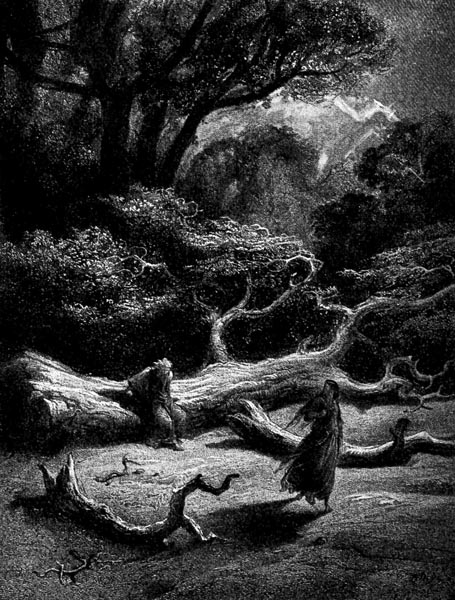The Wanderer
An Abridged Version, Translated from the Anglo-Saxon

‘I have made his glory mine’
Doré, Gustave, 1832-1883 from The Poetic and Dramatic Works of Alfred Lord Tennyson (p523, 1899) - Alfred Tennyson, Baron, 1809-1892
The British Library
Translated by A. S. Kline © Copyright 2010, All Rights Reserved.
This work may be freely reproduced, stored and transmitted, electronically or otherwise, for any non-commercial purpose. Conditions and Exceptions apply.
Translator’s Note: This is an abridged version. I have started with line 8 and concluded with line 110 (of 115) for artistic coherence. Instead of displaying the caesura between half-lines of the original Exeter Book (which is dated prior to 1050AD), or running the two halves of each line together I have preferred, for clarity and impact, to give each half-line as a separate full line. The original Old English text may be found online here.
The Wanderer
Oft I alone must 8
Utter my sadness,
Each day before dawn.
Living there’s none,
No man, to whom
I’d clearly speak
My innermost mind.
I know among
Men the custom 12
Truly is noble,
That a man his
Thoughts fast bind,
Hiding his mind-hoard,
Whatever he thinks.
For weary spirit may not
Withstand fate’s ways,
Nor does a sad heart 16
Offer men aid.
Thus oft the glory-bound
Bind fast their
Drear thoughts
In their own breast.
So I, wandering,
Bereft of my homeland,
Far from my kinsmen, 20
Oft in wretchedness,
My innermost feelings
Am forced to fetter,
Over these long years
Since my lord I buried
Deep in the dark earth,
And from there, dully,
Went winter-freighted 24
Over the icy waves,
Seeking, hall-bereft,
Some giver of treasure;
Where I, far or near,
Might find one
In mead-hall, who
Knew my own clan,
Or might console me, 28
I, the friendless one,
Win with his welcome.
He who suffers it
Knows how sorrow
Makes cruel companion
To one who goes light
Of all loving friends.
Wandering wreathes him 32
Not the winding gold,
A frozen spirit, now,
Not the fruits of earth.
Halls of the warriors
He recalls, gold-giving:
How in youth his lord,
Ever treasure’s friend,
Won him to wining. 36
Dead now all joyfulness!
Thus he suffers it,
Who the true counsel
Of his own dear lord
Has long time forgone:
Then sleep and sorrow,
Working together,
Often will bind 40
The lonely sufferer.
He thinks there in mind,
That he his own lord
Clasps there and kisses,
And to his knees
Presses hand and head,
As when once before
In times gone by, 44
He held the throne.
Then he awakens,
A friendless man,
Seas before him
The barren waves,
Sea-birds bathing
Preening their feathers,
In rime and snow fall, 48
And hail there mingling.
Then are they heavier
Wounds of heart
Sore for its lord.
Sorrow succeeds
When mind surveys
Memories of kinsmen:
He greets them gladly, 52
Scans them eagerly,
A man’s companions,
Swimming ever away,
Seafaring spirits,
Bringing him little
Of their human speech.
The care is renewed
Of he who must send 56
Time after time
His weary heart
Out over wave’s ply.
Truly I know not
Why my spirit
Fails to darken
Seeing the whole
Earthly life of men 60
All the world over,
How swiftly they
Flee the stage,
The proud nobles.
So this middle-earth
Day by day
Decays and falls:
So no man can call 64
Himself wise, ere he’s aged
A deal of years in this world.
The wise must be patient,
Not too impulsive,
Not too hasty of word,
Nor too weak a warrior,
Nor too recklessly wild,
Nor too fearful, too hopeful, 68
Nor too greedy for gifts,
Nor too ready to boast,
Before he knows clearly.
A man shall abide
Before he speaks oaths,
Until proud-hearted
He sees clearly
Where the intent 72
Of his heart will tend.
The wise man must see,
How all will be ghastly,
When all the weal of this
World lies wasted,
As now here and there
Over this middle-earth,
Wind-beaten 76
The walls stand
Rime be-frosted,
Buildings storm-swept.
The halls are broken,
Warrior lords lie
Bereft of delight.
Fallen the throng,
Proud by the wall. 80
Some war wasted,
Ferried on their way,
Him the bird took
Beyond the deep seas,
Him the grey wolf
Garnered for death,
Him all dreary
Man hid in an 84
Earthly grave.
So He who made men
Shattered the city,
Till empty of sound,
Its citizens silent
The old work of giants
Stood empty.
One who in wisdom 88
Pondered this estate,
And of this dark life
Considered deeply
Knowing in spirit,
Oft thought from afar
Of countless conflicts,
Speaking these words:
Where is the horse now? Where is the rider? 92
Where is the gold-giver?
Where is the seat at the gathering?
Where now are the feasts in the halls?
Alas for the gleaming cup!
Alas the mailed warrior!
Alas for the prince’s pride!
How that age has passed,
Dark under night-helm, 96
As though it never were!
Now there stands at last
Where were the dear host,
A wall wondrous high
Wound with serpents.
The warriors were taken
By the spear’s glory,
Weapons ripe for kill, 100
Fame of the fated;
These cliffs of stone
Storms batter,
Falling frost
Earth fetters,
Promise of winter;
Then comes darkness,
Night-shadows deepen, 104
From the north descends
Fierce hail,
Malicious to men.
All is sorrowful
In this earthly realm,
The wheel of fate alters
World under heavens.
Here be gold fleeting, 108
Here be friend fleeting,
Here be man fleeting,
Here be kin fleeting,
All this Earth’s estate,
Idle, is wasted!